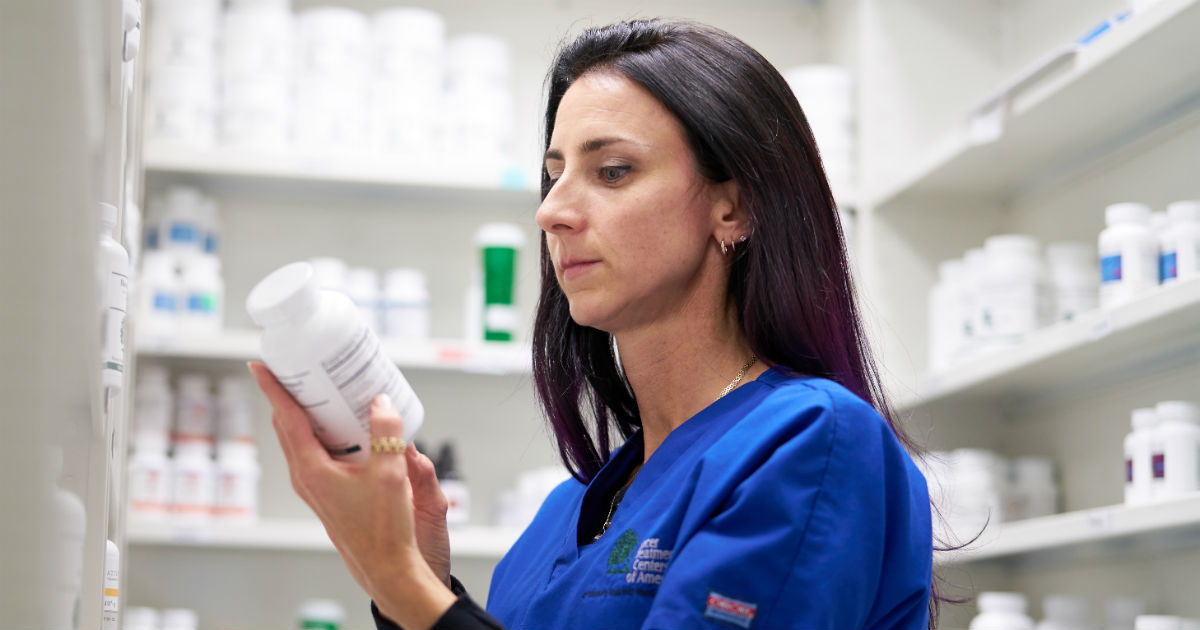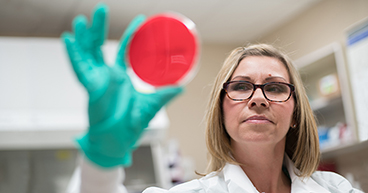
Pour some cola on your car battery terminals, and the soft drink will do a great job removing built-up corrosion. It can also clean toilet bowls, make tarnished coins shine anew and remove splattered bugs from windshields. Medicines can be just as versatile. Drugs used to treat a variety of illnesses may end up being used to treat conditions for which they were not initially approved. For instance:
- Remdesivir, an experimental Ebola drug, is being used to treat COVID-19 patients.
- Sildenafil (Viagra®), a drug developed to treat angina, may help men overcome erectile dysfunction.
- Minoxidil (Rogaine®), a hypertension drug, may help reverse hair loss.
“If a drug has been shown to be safe for a given clinical indication, it may be easier to examine that drug for another indication, rather than having to explore the safety of a completely new pharmaceutical agent,” says Maurie Markman, MD, President of Medicine & Science at Cancer Treatment Centers of America® (CTCA).
Even some cancer patients may be benefitting from drugs approved for other conditions. For example:
- The BCG vaccine, created to protect against tuberculosis, is now used to treat some cases of early-stage bladder cancer.
- Thalidomide, an anti-nausea pregnancy drug infamous for causing birth defects in the 1960s, has been deemed safe for treating some cases of multiple myeloma, though it is still not recommended for pregnant women.
- Prednisone, an anti-inflammatory corticosteroid originally developed to treat arthritis, may be used for palliative care for a number of cancers, including leukemia and lymphoma.
“The oncology community is constantly looking at both novel agents and drugs that have been used for a different clinical indication and may be relevant for an alternative purpose,” Dr. Markman says.
Repurposing drugs may bring about new treatments faster and cheaper than by developing new drugs. Substantial research has already been done on existing drugs, and their safety and many of their side effects have been documented. That may shorten clinical trial time geared toward the new use, ultimately reducing the time needed to secure U.S. Food and Drug Administration (FDA) approval.
Researchers have identified hundreds of drugs with cancer-fighting potential. In Boston, the Dana Farber Cancer Institute has teamed up with the Broad Institute of MIT and Harvard, using Broad’s Drug Repurposing Hub to test the effectiveness of some existing drugs against various cancers. In Europe, the Anticancer Fund launched its ReDO (Repurposing Drugs in Oncology) project (to identify drugs with promising potential for repurposing, bring them to the attention of clinical investigators and help develop necessary research.
“The more we know about the benefits or risks of a drug, the greater assurance an oncologist will have that administering that drug to a patient will result in a clinical benefit rather than doing harm,” Dr. Markman says.
CTCA® is participating in the Targeted Agent and Profiling Utilization Registry (TAPUR™) Study, which is examining drugs approved for one type of cancer to determine whether they may be used to treat other forms of the disease. In the TAPUR study, spearheaded by the American Society of Clinical Oncology, patients with cancers that have specific genetic features may be treated with drugs approved for other cancers with the same mutations. For instance, TAPUR researchers last year noted positive outcomes using pembrolizumab (Keytruda®), a checkpoint inhibitor drug approved to treat patients with lung cancer, melanoma and several other cancers, finding that it demonstrated anti-tumor activity in metastatic breast cancer patients with high tumor mutation burden (TMB-h). The FDA this month approved pembrolizumab for some cancers with TMB-h.
A number of CTCA patients are participating in the “paradigm-changing” TAPUR study, Dr. Markman says. “Several of the regimens examined provided highly provocative results, which hopefully will lead to further investigation and, potentially, future regulatory approval,” he says.



